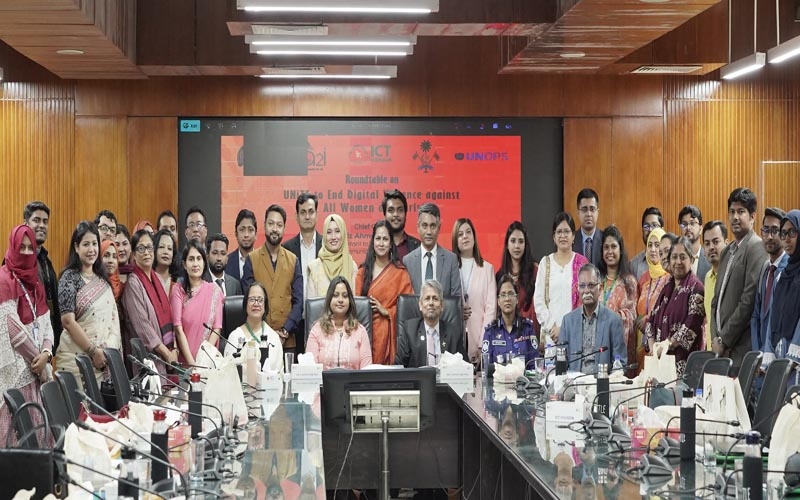- Middle East War Puts Bangladesh Jobs at Risk |
- Starmer criticises Trump, defends UK position not to allow use of its bases |
- Iran War: Nuke watchdog urges restraint amid ongoing strikes |
- 80pc tube wells in Chhatak run dry; water crisis acute |
- Advance Eid train ticket sale begins |
Bangladesh Urged to Boost Digital Safety for Women Online

A high-level roundtable convened today in Dhaka called for urgent measures to protect women and girls from rising digital violence in Bangladesh. Organized by UNOPS Bangladesh in collaboration with Aspire to Innovate (a2i), the ICT Division, the Bangladesh Institute of International and Strategic Studies (BIISS), and the High Commission of the Republic of Maldives, the event, titled “UNiTE to End Digital Violence Against All Women and Girls,” brought together government officials, diplomats, legal and mental health experts, civil society representatives, private sector leaders, and media professionals.
Held at the ICT Division in Agargaon, the roundtable focused on the alarming increase in online gender-based violence, including cyberstalking, harassment, image-based abuse, and deepfake exploitation. Participants discussed the need for a coordinated, multi-sectoral approach to build a safer digital environment for women and girls in Bangladesh.
The session was moderated by Dr Tasneem Siddiqui, Executive Director of the Refugee and Migratory Movements Research Unit (RMMRU). Opening the event, Md. Abdur Rofiq, Project Director (Joint Secretary) of a2i, highlighted the dual nature of digital spaces in Bangladesh: providing opportunities for participation and empowerment, while also exposing women and girls to new forms of abuse. “Digital spaces are essential for opportunity and participation, but they must not become spaces of fear. Protecting women and girls online is fundamental to ensuring an equitable digital future,” he said.
Sudhir Muralidharan, Country Manager of UNOPS Bangladesh and Bhutan, addressed the audience as Special Guest, underscoring the shared responsibility of all stakeholders. “Digital violence is not a standalone issue—it is a development challenge, a governance challenge, and a human rights challenge. Today’s dialogue underscored the need for collective, coordinated action that centers the safety and dignity of women and girls,” he said.
Barrister Tasnuva Shelley, Deputy Attorney General and Advocate at the Supreme Court of Bangladesh, delivered the keynote speech, examining the gaps in legal and institutional frameworks. “Technology is evolving faster than our laws. Survivors need faster remedies, stronger safeguards, and systems that can respond meaningfully to new forms of digital abuse,” she noted, stressing the importance of responsive legal mechanisms.
Shiuneen Rasheed, representing the Maldivian High Commission, reaffirmed regional support for digital safety initiatives. “We stand with Bangladesh in recognizing digital safety as a regional priority. Empowering women and girls online is central to ensuring their full participation in society,” she said.
Shish Haider Chowdhury, ndc, Secretary of the ICT Division, emphasized the government’s commitment to digital governance and the safety of its citizens online. He highlighted ongoing efforts to enhance reporting systems, strengthen cyber investigation capacities, and promote responsible digital citizenship. “Bangladesh’s digital transformation must be anchored in safety,” he said.
The roundtable featured two in-depth panel discussions. The first, “Navigating the Digital Minefield: A Survivor’s Journey and the Psychological Toll,” explored the emotional, psychological, and legal consequences of digital violence. Panelists included prominent actresses Azmeri Haque Badhon and Sabnam Faria, law enforcement representatives, and legal experts. They shared personal stories, insights, and strategies to support survivors and raise awareness of the issue.
The second panel, “Building a Safer Digital Bangladesh: A Multi-Stakeholder Roadmap,” brought together representatives from a2i, Oxfam, and Robi Axiata PLC. Discussions focused on technological innovation, private sector accountability, public awareness campaigns, and improved coordination between government and civil society to prevent and respond to digital abuse.
Other notable participants included Dr. Muhammad Ekramul Haque, Acting Dean of the Faculty of Law at the University of Dhaka; Maha Abu Emier, International Project Manager at a2i; Dr. Shehela Pervin, Additional DIG and General Secretary of Bangladesh Police Women Network; and Anamika Bhakta, Senior Director of Robi Axiata.
The roundtable concluded with a collective call to action, emphasizing the urgent need for stronger policy frameworks, user-friendly reporting mechanisms, enhanced digital literacy, and cross-agency collaboration. The session highlighted that protecting women and girls online is not only a legal or technological challenge but a societal imperative, central to Bangladesh’s vision of a safe, inclusive, and equitable digital future.

